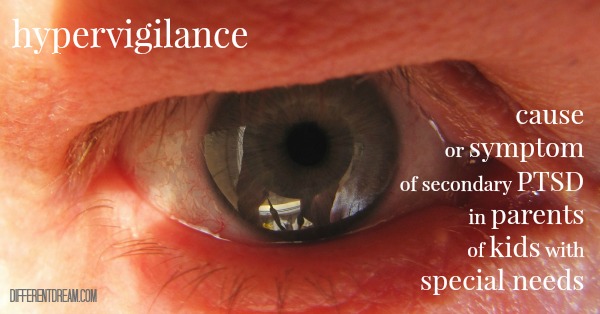Is Hypervigilance a Cause or Symptom of PTSD? Pt. 4

The Different Dream’s series about special needs parenting stress, trauma, and PTSD is back in 2016 after a few weeks off for the holidays. The first post introduced the series, while the second explained the difference between trauma and PTSD. The third post answered two questions: Can the stress of raising a child with PTSD result in a parent with PTSD? What other kinds of parenting trauma can lead to PTSD? Today, child psychologist Liz Matheis takes a look at another question submitted by the stressed-out parent of a child with special needs. Does the state of hypervigilance that special needs parents experience lead to PTSD or is it a symptom? Read on to find out why the answer to the question isn’t a simple one.
People who experience anxiety tend to be exceptionally aware of their environment. They are familiar with where they are in space and time in relation to others. Some are always aware of the location of the closest exit. This extra aware state of mind is referred to as hypervigilance. It also kicks in when people with anxiety enter into a new or unfamiliar environments and are not familiar with the floor plan. They consider it a potential threat or harm. It is exhausting to live with the constant need to scan the environment and look for potential dangers.
Parents of children with special needs scan the environment for potential dangers or triggers for their kids. They are looking for new or unfamiliar environments that serve as potential triggers for a child with anxiety or a sensory processing disorder. Parents know that just entering a friend’s home or going to a birthday party are loud, scary, and smelly enough to trigger meltdowns or aggression.
At times, it is okay to be hypervigilant, especially when entering a novel situation, like a new job. Hypervigilance allows people to stay aware long enough to process the office culture, norms, worth ethic, and relationships. Eventually non-hypervigilant people let their guard down and function as they should. However, for someone who is anxious or under excessive stress, continual hypervigilance results in increased physical and psychological arousal that becomes physically exhausting over time. Constant hypervigilance leads to sweating, increased heart rate, shallow or rapid breathing, and an inability to ‘let go.’ This can result in a inability to sleep, engage in conversations, and maintain relationships.
Over time, this pattern of constant hypervigilance can become a bigger part of PTSD, especially if the parent feels traumatized by her/his child’s special needs and journey. In the early phases, hypervigilance is simply a sign of anxiety. But over time, a person who has been severely or repeatedly traumatized is likely to experience other symptoms of PTSD, also.
So the answer to the question Is hypervigilance a cause or symptom of PTSD? the answer is yes. Hypervigilance can cause PTSD if it continues over a long period of time. But it can be also be a symptom of PTSD, too.
Your Questions about Parenting Trauma and PTSD
Do you have questions about parenting trauma, stress, and PTSD? If so, you’re invited to leave them in the comment box for Dr. Liz. Who knows? Her answer may appear in one of the posts in this series.
Do you like what you see at DifferentDream.com? You can receive more great content by subscribing to the quarterly Different Dream newsletter and signing up for the daily RSS feed delivered to your email inbox. You can sign up for the first in the pop up box and the second at the bottom of this page.

By Liz Matheis
Dr. Liz Matheis is a clinical psychologist and school psychologist in Parsippany, NJ. She offers support, assessments, and advocacy for children who are managing Autism Spectrum Disorders, ADHD, learning disabilities, and behavioral difficulties, as well as their families. She is also a contributor to several popular magazines. Visit www.psychedconsult.com for more information.
6 Comments
Submit a Comment
Subscribe for Updates from Jolene
Related Posts
Single Parents, Special Needs and PTSD, Pt. 9
Single parents raising kids with special needs are the focus of this post in Different Dreams series about trauma and stress.
PTSD, Stress and Moving On as Special Needs Parents, Pt 8
Moving on as special needs parents can be hard. Dr. Liz Matheis offers suggestions about how to make it easier for parents and children alike.
Finding Balance in Special Needs Parenting and Stress, Pt. 7
Finding balance in special needs parenting and stress is a tricky proposition. That’s the question answered in this post in the series about PTSD and stress.






They are good things to think about Debi, and you are right. There’s a good side and a bad side to hypervigilance. The key is finding ways to relax and enjoy life even while waiting for the other shoe to drop.
This is a fascinating chicken vs. egg question — and we may never know. As you say, that hypervigilance is often serving us well! I think parents of medically compromised children are always waiting for another emergency. It’s good as long as it doesn’t impair our ability to enjoy the uncomplicated moments of happiness. Perhaps most important is for those around us to recognize that we came by this attitude honestly and for good reason, and to help us to think through our anxiety logically — is this REALLY a moment for panic, or are we just reliving another experience that was far more serious than this one? All good things to think about.
Very interesting, Andrea. You have described the need for hypervigilance with a medically-fragile child and how it affects parents perfectly. Hopefully, you’ll learn more about how to manage those responses as the series progresses.
Interesting! I have been struggling with symptoms of PTSD and anxiety since the traumatic birth of my son. Because of his early birth, he has extra needs that require constant supervision and vigilance. He also has other health issues (unrelated to his prematurity) that are significant. Every time we are about to let our guard down, we seem to get yet another diagnosis. The state of constant anxiety/hypervigilance has definitely exacerbated my symptoms of PTSD. It’s a vicious cycle.
Thanks Amy. I agree.
Great post!